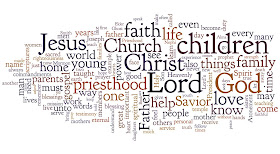
For the next few days, you could find me on the bus, happily giggling and fighting back bursts of laughter (it's kind of strange to be seen so bubbly while reading punctuation books on a bus—even a university bus). I liked the book so much, I bought it.
Despite my pleasure with the book, it was a tough sell getting my wife to read it, too. After all, who but the unsalvageably strange would delight at funny books on punctuation? I'm happy to report, that after a spell of not being prodded, she decided to read it. I received a call at work with her in a fit of laughter telling me how much she loves the book and wondering aloud why she didn't read it earlier!
While this example is used to illustrate that punctuation can, indeed, be used for humor, I'm thinking of a more serious application: the comma-noun.
What is the comma-noun you ask? You've seen this before, but perhaps didn't give it a name. It appears on business cards, in email signatures, and on various publications. Common examples include:
- [Name], M.D.
- [Name], PhD
- [Name], CEO
What comma-nouns do you have? I imagine we all have something we could tack at the end of our name, and they don't have to be education- or profession based, either. I had a friend who had business cards that simply said:
Chris Coppel, A Friend
It turns out that his comma-noun was a perfect descriptor of who he was. However, what I'm getting at is that I want to know what my comma-noun is. I could easily use a degree or job title (and I have before), but if I wanted to make a business card to give in a non-work environment, what descriptor would describe who I really am?
Who am I?
Clark Siler, Husband
Clark Siler, Father
Clark Siler, Son
Clark Siler, Friend
Clark Siler, Christian
Clark Siler, Mormon
Clark Siler, Student
Clark Siler, Passionately Curious
Clark Siler, Believer
Clark Siler, Dreamer
Clark Siler, Achiever
Clark Siler, "Best Daddy in the World" (as my six-year-old calls me)
This list is a small sample of comma-nouns that I could claim, but do they completely describe who I am? Does a single word exist that would be a satisfactory comma-noun for representing the real me?
This could be the starting point for many discussions—titles, pride, self-discovery, judgment—but I used it as a self evaluation. I need to be honest here: as I thought of my comma-noun list, I didn't include many that I thought of. There was a longer list of things that I'm embarrassed or ashamed of that could well describe me, or at least the me that I let myself be sometimes.
The list of comma-nouns I thought of is quite long (longer than what I typed above). After this exercise, I'm left to wonder which comma-noun I would choose if I had to pick only one to use as a greeting to the world announcing who I am.
Can there be just one? Is it okay to be different things in different situations?
In a chapter that could be used as a guide in finding many comma-nouns for ourselves, we read of Paul's counsel to "Be of the same mind one toward another" (Romans 12:16). Does this mean that we need to always be the same, whittling our list of comma-nouns down to just one that describes us all the time?
I don't know.
I guess the good thing about having "colloquy" on this blog title is that I can leave things in a state of unknown, leaving the discussion open for further analysis. Until this is resolved, I remain:
Clark Siler, Confused














